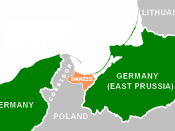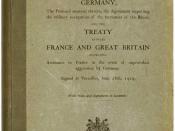The French thought it wasn't hard enough on the Germans, the Americans found it at odds with principle of self-determination, and the Germans bitterly resented it. The Treaty of Versailles satisfied no one, and enforced unfair conditions on the Germans. The treaty forced Germany to be unarmed while other nations remained fully armed. In addition it gave German populated territory to other countries and made them pay implausible amounts of reparation. Most significantly, it led to the fall of the Weimar Republic and the rise of Hitler, and ultimately the Second World War.
Part V in the Treaty of Versailles forced Germany to reduce their army to 100,000 men, none of which could be conscripted and were devoted exclusively to the maintenance and order within the country. As well they were to get rid of all armored vehicles, and their navy was reduced to a few small ships. Submarines, military aircraft and war industries were all prohibited.
While all of these limitations were set on Germany, the newly formed League of Nations tried later to negotiate disarmament of all the countries in the world. France, along with other allies, decided that they would have nothing to do with it. France had an air force of 3,046, while Germany had none, unable to defend itself fully if an attack were to take place.
Germany was forced to surrender Alsace-Lorraine, the Saar Valley, and regions to Denmark and Belgium. They lost parts of Posen and West Prussia, including the Polish Corridor and Danzig, a seaport. Both the Saar Valley and Danzig were mainly German inhabited, with the Saar Valley containing coalmines, depriving them of an important resource. It was said after the treaty, "...The British empire at present covers a quarter of the globe while the German Empire consists of a small...



...
Wonderfully captivating Introducing paragraph. I don't think anyone could have written a paragraph as well as you have here. The rest of the essay is well written and backs up the main theme of the treaty of Versalles and the concluding paragraph is also very well written.
1 out of 1 people found this comment useful.